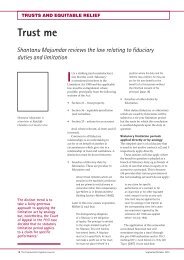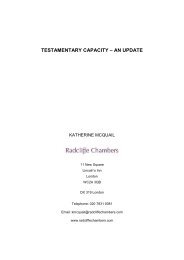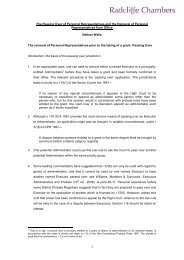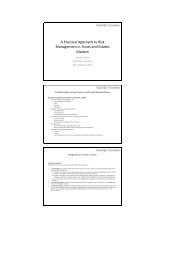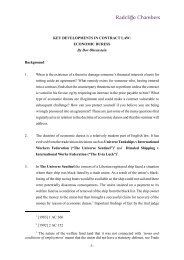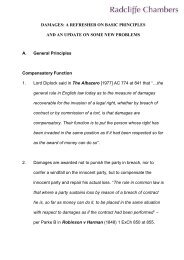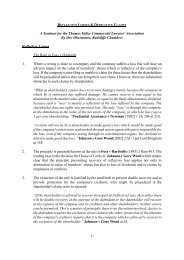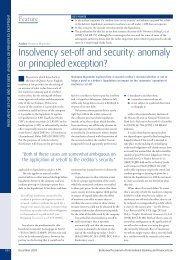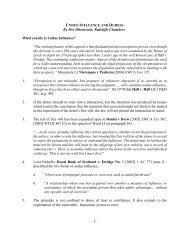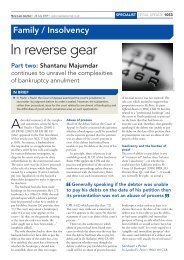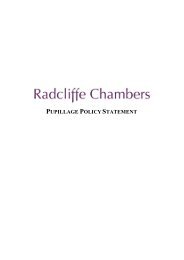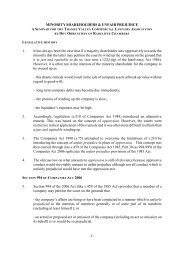Crastvell Trading Limited v Bozel SA - Radcliffe Chambers
Crastvell Trading Limited v Bozel SA - Radcliffe Chambers
Crastvell Trading Limited v Bozel SA - Radcliffe Chambers
Create successful ePaper yourself
Turn your PDF publications into a flip-book with our unique Google optimized e-Paper software.
after the loans became due, a dispute arose with regard to the ability of the<br />
defendants to repay the loan and the extent to which the claimants were interfering<br />
with it, were not matters which were within the consideration of the parties when<br />
they entered into the agreement. Of course, I readily accept that the court would<br />
imply a term to the effect that the claimants would not take steps to prevent the<br />
performance of the defendants’ repayment obligations, namely their obligation to<br />
repay when those sums came due. But at the due date it is not suggested that the<br />
claimants had, at that stage, taken any steps to impede the defendants from<br />
repaying the loan. The reason why the defendants did not repay the loan was quite<br />
straightforward: they did not have any money. That is why they did not pay on the<br />
due date.<br />
31 There seem to me to be serious difficulties about implying a term relating to what<br />
steps the claimants could take after their loan became due and repayable. It is<br />
obvious that the claimants will wish to enforce its right to repayment and in the<br />
process to ensure that it does not lose any security. In that latter regard, the<br />
claimants would want to ensure that a third party is not invited to embark on a<br />
course of action which would prejudice the claimants’ claim and/or defendants’<br />
security. The term that is being suggested by the defendants would effectively<br />
impede the claimants from enforcing its justified rights. I see absolutely no need to<br />
incorporate or imply any such term. To the contrary, it would be quite improper.<br />
32 There is, it seems to me, some force in the proposition that what the defendants are<br />
seeking to do by virtue of this argument is either to raise a complaint in regard to<br />
the standstill agreement (which is not made), or alternatively to promote a claim<br />
which might more properly be advanced by way of economic tort. Furthermore,<br />
there is, it seems to me, a serious difficulty on the facts. The high spot of the<br />
defendants’ case is that an agreement with a firm called Trilliant with Welgate was<br />
stymied by the claimants. The material that touches on that issue, which is<br />
contained within the bundle and has been read to the court, does not seem to me to<br />
begin to make good that complaint.<br />
33 What had happened was that Welgate had entered into negotiations with a firm<br />
called Trilliant with a view to Trilliant purchasing the shares of <strong>Bozel</strong>. Wind of<br />
this got out in the course, as I understand it, of the Luxembourg proceedings, albeit<br />
of a slightly different transaction. On 11 th September 2009 the claimants wrote to<br />
Trilliant recording the fact that it was understood that Trilliant were going to buy<br />
the shares of the <strong>Bozel</strong> subsidiaries, and complaining that despite the fact that<br />
Trilliant purported to be acting with the cooperation of the claimant, it had in fact<br />
never contacted them. More importantly perhaps even than that, it was pointed out<br />
that Trilliant had never approached the claimants in order to ensure that the<br />
recovery of their loan was protected by payment of all or part of the proceeds of<br />
BEVERLEY F NUNNERY & CO<br />
OFFICIAL SHORTHAND WRITERS



